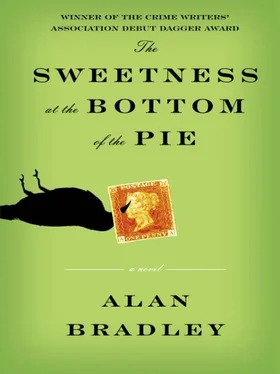Alan Bradley - The Sweetness at the Bottom of the Pie
Здесь есть возможность читать онлайн «Alan Bradley - The Sweetness at the Bottom of the Pie» весь текст электронной книги совершенно бесплатно (целиком полную версию без сокращений). В некоторых случаях можно слушать аудио, скачать через торрент в формате fb2 и присутствует краткое содержание. Жанр: Старинная литература, на английском языке. Описание произведения, (предисловие) а так же отзывы посетителей доступны на портале библиотеки ЛибКат.
- Название:The Sweetness at the Bottom of the Pie
- Автор:
- Жанр:
- Год:неизвестен
- ISBN:нет данных
- Рейтинг книги:3 / 5. Голосов: 1
-
Избранное:Добавить в избранное
- Отзывы:
-
Ваша оценка:
- 60
- 1
- 2
- 3
- 4
- 5
The Sweetness at the Bottom of the Pie: краткое содержание, описание и аннотация
Предлагаем к чтению аннотацию, описание, краткое содержание или предисловие (зависит от того, что написал сам автор книги «The Sweetness at the Bottom of the Pie»). Если вы не нашли необходимую информацию о книге — напишите в комментариях, мы постараемся отыскать её.
The Sweetness at the Bottom of the Pie — читать онлайн бесплатно полную книгу (весь текст) целиком
Ниже представлен текст книги, разбитый по страницам. Система сохранения места последней прочитанной страницы, позволяет с удобством читать онлайн бесплатно книгу «The Sweetness at the Bottom of the Pie», без необходимости каждый раз заново искать на чём Вы остановились. Поставьте закладку, и сможете в любой момент перейти на страницу, на которой закончили чтение.
Интервал:
Закладка:
I hated to do it, but it was the only tool I had with me.
TEN MINUTES LATER, we were sipping cocoa in the station tearoom, P. C. Glossop and I. He had told me that he had a girl just like me at home (which, somehow, I doubted), name of Elizabeth.
"She's a great 'elp to her poor mother, our Lizzie is," he said, "seeing as 'ow Missus Glossop, the wife, that is, 'ad a fall from a ladder in the happle horchard and broke 'er leg two weeks ago come Saturday."
My first thought was that he had read too many issues of The Beano or The Dandy; that he was laying it on a bit thick for entertainment purposes. But the earnest look on his face and the furrowed brow quickly told me otherwise: This was the real Constable Glossop and I would have to deal with him on his own terms.
Accordingly, I began to sob again and told him I had no mother and that she had died in far-off Tibet in a mountaineering accident and that I missed her dreadfully.
"'Ere, 'ere, miss," he said. "Cryin's not allowed in these 'ere premises. Takes away from the natural dignity of the surroundin's, so to speak. You'd best dry up now 'fore I 'ave to toss you in the clink."
I managed a pale smile, which he returned with interest.
Several detectives had slipped in for tea and a bun during my performance, each one of them giving me a silent thumbs-up smile. At least they hadn't asked any questions.
"May I see my father, please?" I asked. "His name is Colonel de Luce, and I believe you're holding him here."
Constable Glossop's face went suddenly blank and I saw that I had played my hand too quickly; that I was now up against officialdom.
"Wait 'ere," he said, and stepped out into a narrow passageway at the end of which there appeared to be a wall of black steel bars.
As soon as he was gone I had a quick look at my surroundings. I was in a dismal little room with sticks of furniture so shabby that they might have been bought directly off the tailgate of a peddler's cart, their legs chipped and dented as if they had suffered a century of kicks in the shin from government regulation boots.
In a vain attempt to cheer things up, a tiny wooden cupboard had been painted apple green, but the sink was a rust-stained relic that might have been on loan from Wormwood Scrubs. Cracked cups and crazed saucers stood sadly cheek by jowl on a draining board, and I noticed for the first time that the mullions of the window were, in fact, iron bars only halfheartedly disguised. The whole place had an odd, sharp odor that I had noticed when I first came in: It smelled as if a jar of gentleman's relish, forgotten years ago at the back of a drawer, had gone off.
Snatches of a song from The Pirates of Penzance flashed into my mind. “A policeman's lot is not a happy one,” the D'Oyly Carte Opera Company had sung on the wireless and, as usual, Gilbert and Sullivan were right.
Suddenly I found myself thinking about leaving. This whole mission was foolhardy, no more than an impulse to save Father; something thrown up from the prehistoric part of my brain. Just get up and walk to the door, I said to myself. No one will even notice you've gone.
I listened for a moment, cocking my head like Maximilian to turn up my already acute hearing. Some where in the distance bass voices buzzed like bees in a far-off hive.
I slid my feet slowly one in front of the other, like some sensuous señorita doing the tango, and stopped abruptly at the door. From where I stood, I could see only one corner of the sergeant's desk outside in the hallway and, mercifully, there was no official elbow resting upon it.
I ventured a peep. The corridor was empty, and I tangoed unhindered all the way to the door and stepped outside into the daylight.
Even though I was not a prisoner, my sense of escape was immense.
I strolled casually over to the bicycle stand. Ten seconds more and I'd be on my way. And then, as if someone had thrown a pail of ice water into my face, I froze in shock: Gladys was gone! I almost screamed it aloud.
There rested all the official bicycles with their officious little lamps and government-issue carriers—but Gladys was gone!
I looked this way and that, and somehow, frighteningly, the streets seemed suddenly different now that I was on foot. Which way was home? Which way to the open road?
As if I hadn't problems enough, there was a storm coming. Black clouds were boiling in the western sky, while those scudding directly overhead were already unpleasantly purple and bruised.
Fear filled me, and then anger. How could I have been so stupid as to leave Gladys unlocked in a strange place? How would I get home? What was to become of poor Flavia?
Feely had once told me never to look vulnerable in unfamiliar surroundings, but how, I found myself wondering, does one actually go about doing that?
That was what I was thinking about when a heavy hand fell onto my shoulder and a voice said, “I think you'd better come with me.”
It was Inspector Hewitt.
"THAT WOULD BE HIGHLY IRREGULAR,” the Inspector said. “Most improper.”
We were sitting in his office: a long narrow room that had been the saloon bar of this onetime coaching inn. It was impressively neat, a room that needed only a potted aspidistra and a piano.
A file cabinet and a desk of quite-ordinary design; a chair, a telephone, and a small bookshelf, atop which was a framed photograph of a woman in a camel-hair coat perching on the rail of a quaint stone bridge. Somehow I had expected more.
"Your father is being detained here until we are in receipt of certain information. At that time he will likely be taken elsewhere, a place which I'm not at liberty to disclose. I'm sorry, Flavia, but seeing him is out of the question.”
"Is he under arrest?" I asked.
"I'm afraid so," he answered.
"But why?" This was a bad question, and I knew it as soon as it was out of my mouth. He was looking at me as if I were a child.
"Look, Flavia," he said, "I know you're upset. That's understandable. You didn't have a chance to see your father before. well, you were away from Buckshaw when we brought him here. These things are always very difficult for a police officer, you know, but you must understand that there are sometimes things which I would very much like to do as a friend, but which, as a representative of His Majesty, I am forbidden to do."
"I know," I said. "King George the Sixth is not a frivolous man."
Inspector Hewitt looked at me sadly. He got up from his desk and went to the window where he stood looking out at the gathering clouds, his hands clasped behind his back.
"No," he said at last, "King George is not a frivolous man."
Then suddenly, I had an idea. Like the proverbial bolt of lightning, everything fell into place as smoothly as one of those backwards cinema films in which the pieces of a jigsaw puzzle jump each into its proper place, completing itself before your very eyes.
"May I be frank with you, Inspector?" I asked.
"Of course," he said. "Please do."
"The body at Buckshaw was that of a man who arrived in Bishop's Lacey on Friday after a journey from Stavanger, in Norway. You must release Father at once, Inspector, because, you see, he didn't do it.”
Although he was a little taken aback, the Inspector recovered quickly and gave me an indulgent smile.
"He didn't?"
"No," I said. "I did. I killed Horace Bonepenny."
14
IT WAS ABSOLUTELY PERFECT. THERE WAS NO ONE who could prove otherwise.
I had been awakened in the night, I would claim, by a peculiar sound outside the house. I had gone downstairs and then into the garden, where I had been put upon by a prowler: a burglar, perhaps, bent on stealing Father's stamps. After a brief struggle I had overpowered him.
Читать дальшеИнтервал:
Закладка:
Похожие книги на «The Sweetness at the Bottom of the Pie»
Представляем Вашему вниманию похожие книги на «The Sweetness at the Bottom of the Pie» списком для выбора. Мы отобрали схожую по названию и смыслу литературу в надежде предоставить читателям больше вариантов отыскать новые, интересные, ещё непрочитанные произведения.
Обсуждение, отзывы о книге «The Sweetness at the Bottom of the Pie» и просто собственные мнения читателей. Оставьте ваши комментарии, напишите, что Вы думаете о произведении, его смысле или главных героях. Укажите что конкретно понравилось, а что нет, и почему Вы так считаете.












